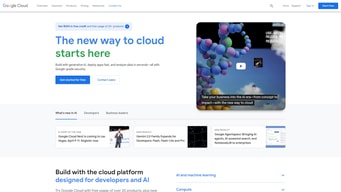

Unclaimed: Are are working at Google Cloud ?
Google Cloud Reviews & Product Details
Google Cloud is a suite of cloud computing services offered by Google, providing a range of hosting and computing options for web applications, data storage, and machine learning projects. It includes services such as Google Compute Engine, Google Cloud Storage, and Google Kubernetes Engine, supporting businesses and developers in building, deploying, and scaling applications across a globally distributed infrastructure.

| Capabilities |
|
|---|---|
| Segment |
|
| Deployment | Cloud / SaaS / Web-Based |
| Support | 24/7 (Live rep), Chat, Email/Help Desk, FAQs/Forum, Knowledge Base, Phone Support |
| Training | Documentation, Live Online, Videos, Webinars |
| Languages | English, French, German, Indonesian, Spanish |


Compare Google Cloud with other popular tools in the same category.

Google Workspace revolutionizes collaboration in the digital workspace. Its seamless integration of Gmail, Google Drive, Docs, Sheets, Slides, and other tools creates a unified platform for teams to work together effortlessly. The real-time editing feature allows multiple users to collaborate on documents simultaneously, promoting productivity and reducing the need for constant email exchanges. Moreover, the extensive range of third-party integrations enhances functionality, catering to diverse business needs. With its intuitive interface and cloud-based accessibility, Google Workspace empowers teams to communicate, collaborate, and innovate from anywhere, anytime.
Google Workspace lacks some advanced features compared to competitors. Navigating its extensive features may be overwhelming initially. Occasional service disruptions and connectivity issues can disrupt workflow.
Google Workspace solves various collaboration challenges faced by modern businesses. By providing a unified platform for communication and productivity tools, it streamlines workflow and enhances team collaboration. Its About, Realtime Collabo, Flexibility, Producitvity, File Storage....
It would be a great platform with user-friendly ui.
No dislike because I haven't faced any problem while using the dialogue flow.
I have used fo creating a chat bot , it is Very useful and dialogue flow is key reason for standards.
I have been using Google Workspace for the last 4 years for my startup. This tool is very easy to use because we all are aware of Google Products like Gmail, Sheets, Slides, Docs and Drive. These tools make our work very handy and collaborative with other teammates. So, on POV this is a useful tool for me.
Google Workspace is no doubt a useful tool, but there are some limitations for product management because with Google Workspace I can't manage the Product & Project management. This Google Workspace is a bit expensive.
Google Workspace is solving multiple problems under one roof we can use Gmail for emailing, Calendar for Invites and Agenda, Docs for Documentation and presentations, manage Spreadsheets for Excel work and do a video conference with Google Meet.
It collects the data as soon as possible compared to other SIEM tools.
Right now i didn't find any flaws in the chronicle.
Security teams often struggle to manage the massive volume of data generated from various sources like firewalls, endpoints, and applications. This makes it difficult to identify and investigate potential security incidents effectively.
I like how concise it is and how it gives me different routes to the same location.
It does not mention cameras or police around the area.
Helps me avoid traffic so it saves time.
Duet AI work very seamlesly with GWS. It has been very easy to connect, create and colaborate.
There is nothing which I do not like but there can be an improvment in speed.
Streamlined Workflow,Unified User Experience,Increased Collaboration,Enhanced Efficiency...
Get environmental assets to market faster by digitizing and automating the measurement, reporting, and verification process.
It’s not just phones that are killing our planet, but the web itself–the largest CO2 producer on the planet after the United States, China, and India. Google is a main part of the Internet.
It provides visibility for each customer into the climate impacts of products purchased from Google Cloud so that customers can report on and take action to reduce those impacts
Google workspace's all application work on autosave model which is help in reduce file saving time and interface of application is very user friendly where easily user get it learn and work on it more effectively. We are easily integarte with other platform. And google customer support is amazing. They are very friendly and solving issues very effectively.
I feel google workspace take sometime more time to load the files. We can make it fast.
Previouly we are using microsoft Suite of office work, during working time if system is switched off due to certain reason like electricity or system hang, in this case our data is not saved on which we are working, But in Google workspace file or data is autosaved that saved our lots of time.
The ease of accessibility and use that it provides along with the sharing options which makes remote work much convenient
Nothing as such. My experience with google workspace has been absolutely lovely. I haven't found any problems to comment on.
It is making connectivity possible which makes remote work extremely convenient and stress free.
easy convenient and flaxible to use it . it has lots of functions to use it. nice customer support
depends on the network you using but sometimes it gets take time to gert relaod
It helps build quickly, securely, and cost effectively with the next generation of modern infrastructure designed to meet specific workload and industry needs